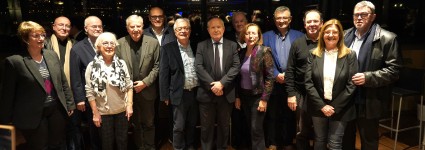Pasqual Maragall's public figure has been talked a lot - even more so in recent times - that is why the presentation of the Spanish version of the book "Pasqual Maragall: thought and action" of RBA in Madrid was considered as a unique occasion to approach the character of Pasqual Maragall, analyzed both from an ideological point of view and from political action. In this sense, Josep Maria Vallès, who presented the event, emphasized that Maragall was "a heterodox person, often misunderstood or misunderstood". Both authors and academics highlighted the originality of the book, which is not a biography, nor does it have a partisan perspective, but rather it is an essay that starts from the analysis of Maragall's own texts.
Two of the authors of the book, Oriol Nel·lo and Joan Fuster-Sobrepere and professors Ignacio Sánchez-Cuenca and Antonio García-Santesmases, starred in a debate focusing on different aspects of Pasqual Maragall. Nel·lo wanted to emphasize that the book is not a biography, but an analytical essay based on Maragall's own texts. The author emphasized the importance of the city as a fundamental axis of the policies of the former mayor of Barcelona. For 15 years, says Nel·lo, Pasqual Maragall worked for the improvement of the living conditions of the city, the balance between the neighborhoods, while also betting on an international projection of the city.
The famous motto "The city is the people" summarizes the idea of ??the Catalan politician about what Barcelona should have been. Contrary to the Catalan right of the time, Pasqual Maragall conceived the city as a place to promote social relations and combat inequalities.
Maragall's vision of the city is also fundamental in understanding its federalist approach, which went well beyond Spain. The creation of networks of cities, the suppression of borders or cooperation between regions is very close to the classic ideas of European federalism.
For his part, also the author of the book, Joan Fuster-Sobrepere, highlighted Pasqual Maragall's "extraordinary internal coherence" and values ??and a unique sensitivity to perceive the changes that will come. The author emphasizes of Maragall an "unlimited inner freedom, that allowed him to put in doubt any certainty. In this sense, says Fuster-Sobrepere was "the antipolitical one".
Of the 40 years of public life, Fuster emphasizes the period from 89 to 92. According to the author, during these years Maragall prepares the most important transformation that has lived in Barcelona that coincides with the peak of his thinking. This time coincides with a crucial historical stage, with the fall of the Berlin Wall, the beginning of the thunder, the signing of the Maastricht Treaty or the Balkan War.
The professors Sánchez-Cuenca and García-Santesmases referred to the figure Maragall from the perspective of those who do not know him personally but who have followed his trajectory closely. The political scientist Sánchez-Cuenca established several parallelisms between the figures of Maragall and Zapatero, the two Social Democratic politicians who had the opportunity to introduce changes in the autonomic system, which had already begun to stagger with Aznar. While in the book the authors refer to the Statute period as a "bitter" era, Sánchez-Cuenca prefers to speak "lost opportunity", an expression already coined by Josep M. Vallès, in an article in 2007. Zapatero and Maragall, says Sánchez-Cuenca, also have in common, "soft leaderships", not authoritarian, and with a reformist agenda that disturbed some social sectors, especially the elites.
Antonio García-Santesmases, on the other hand, lived closely at the beginning of the creation of socialism in Catalonia and emphasized his surprise when he saw the hegemony of socialism in Catalonia, which was able to include the workers' part, often of immigrant people from all over Spain, and the most progressive wing of bourgeois Catalanism.
The person in charge of closing the ceremony was Pasqual Maragall's brother, Ernest Maragall, currently active in politics, who stressed that the importance of not overlooking the current moment and the need to contribute to denouncing the democratic deficiencies of the State .









